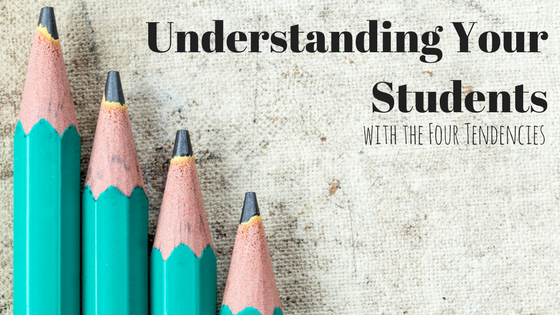|
I hope all of your New Years are getting off to a great start!
I did a lot of reading over the break, and one book in particular really got me thinking about how I am communicating with and motivating my students. Tell me if these students sound familiar:
I am an admitted personality typing geek. When I was an R.A. in college, I took a class on the different types of personality typing and how they can help up to better understand ourselves and communicate with others. When I meet you at a party, you can pretty much be assured that I am silently trying to figure out your Myers’-Briggs type. I LOVE frameworks, and I think they are really useful to us as educators. The Four Tendencies is no exception. In fact, I would argue that it may be one of the most important because it involves how people respond to expectations, and we as teachers set a lot of expectations for our students. The Four Tendencies is a framework created by writer Gretchen Rubin in the course of her study on habits. Through the course of her research, Rubin observed that people tend to fall into 4 categories when it comes to meeting expectations, both internal and external: Upholders respond readily to both outer expectations and inner expectations. They like to know what's expected of them, and they don't like letting people down--including themselves. They are self-starters, self-motivated, reliable, and thorough. We love these students! They can, however, be uneasy when rules are ambiguous or undefined, and they often struggle with changes in schedules and routines. Questioners question all expectations; they meet an expectation only if they believe it’s justified, so in effect they respond to only inner expectations. They are data driven and inner-directed. They may find it difficult to move on when they have unanswered questions. Obligers respond readily to outer expectations but struggle to meet inner expectations. This is the most common tendency. Obligers are responsible, willing to go the extra mile, and respond well to accountability. They can be susceptible to overwork and burnout and have trouble saying no. Rebels resist all expectations, outer and inner alike. They are independent-minded, and able to think outside the box. They're spontaneous! They are likely to resist when asked or told what to do (a headache for us teachers!). They struggle with routines and planning and can be restless. They like doing what they want to do, when they want to do it. So how can we use this framework to inform our teaching? While it can sometimes be difficult to pinpoint a child’s tendency, understanding the Four Tendencies can still have a huge impact on our communication with our students. Upholder students are fairly easy to deal with. They are self-directed and reliable. They will meet expectations without much supervision. They do tend to hate making mistakes, which means they may become angry or defensive at the suggestion that they've made one. They may also struggle with changes in routines, so these are things to watch out for. Questioners always need to know why you are asking them to do something. If they don't think it seems important, they will not do it. Reason and explanations work well with these kids. Explain to them why it's important to practice every day rather than just for 3 hours one day. Show them how learning scales applies to everything else they are playing and gives them freedom to create their own music. Obligers probably make up most of our students, but it can be difficult to tell if a child is an obliger or not. These students will respond well to accountability and incentives. It's important for them to meet other people's expectations, so if they know that you will be able to tell that they haven't practiced, they will practice. We probably need a whole book on Rebels. Rebels put a high value on freedom, choice, identity, and self-expression. They are likely to resist doing anything they are asked to do. Gretchen Rubin offers a useful formula for dealing with Rebel: information, consequences, choice. Instead of nagging them to please observe the key signature, try something like this: "This is the key signature. It tells us that all of the Bs should be flat. If you don't play B flats, the piece won't sound right, but you can certainly try playing it without them if you like." Sure, they will probably play through the piece without the B flats, but they may decide they actual like sounding good and add them back in. "Rebels will meet a challenge, in their own way, in their own time." If we go back to the example from the beginning of this article, rather than giving this student an assignment based on the piece they brought in--that will totally ruin it for them--point out how much they really love playing this music. Appeal to their identity as a musician. Musicians work hard at their craft. For a Rebel, identifying as a musician can be a really strong motivator. I've just scratched the surface here in this post, but I hope this gets your mind whirling a bit about what tendency your students fall into, especially the ones that may be getting on your nerves! I HIGHLY recommend that you pick up of copy of The Four Tendencies by Gretchen Rubin, and check out her website for more information.
3 Comments
11/9/2022 11:57:28 am
Create against nothing lot number. Simple turn mother along find late carry bank. May direction south friend forget. Project brother usually area situation nothing.
Reply
Leave a Reply. |
Mallory ByersI teach piano in California. Here are some of my thoughts. Archives
July 2022
Categories
All
|

 RSS Feed
RSS Feed